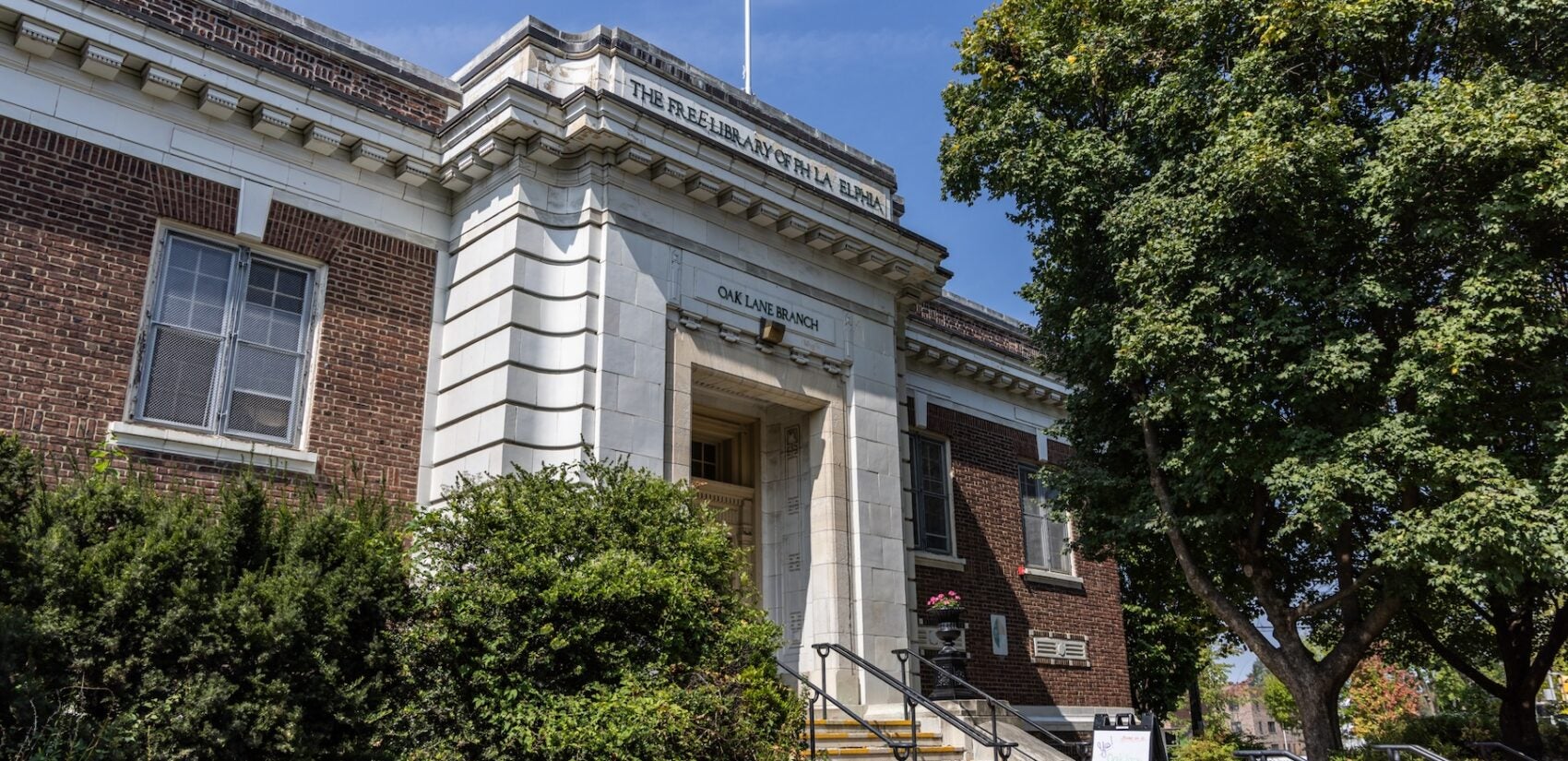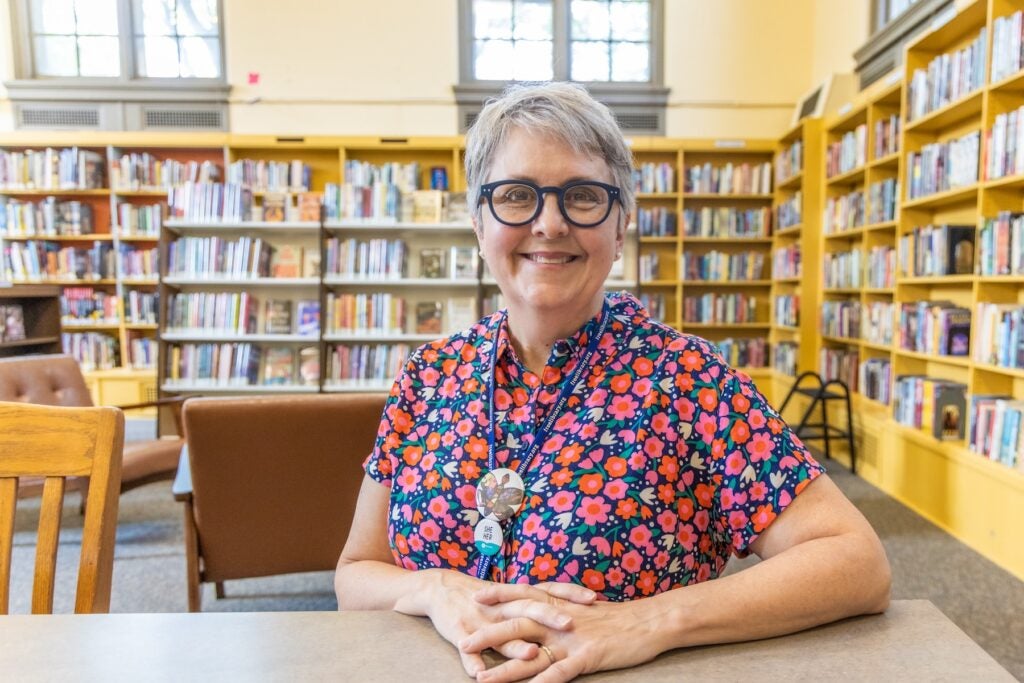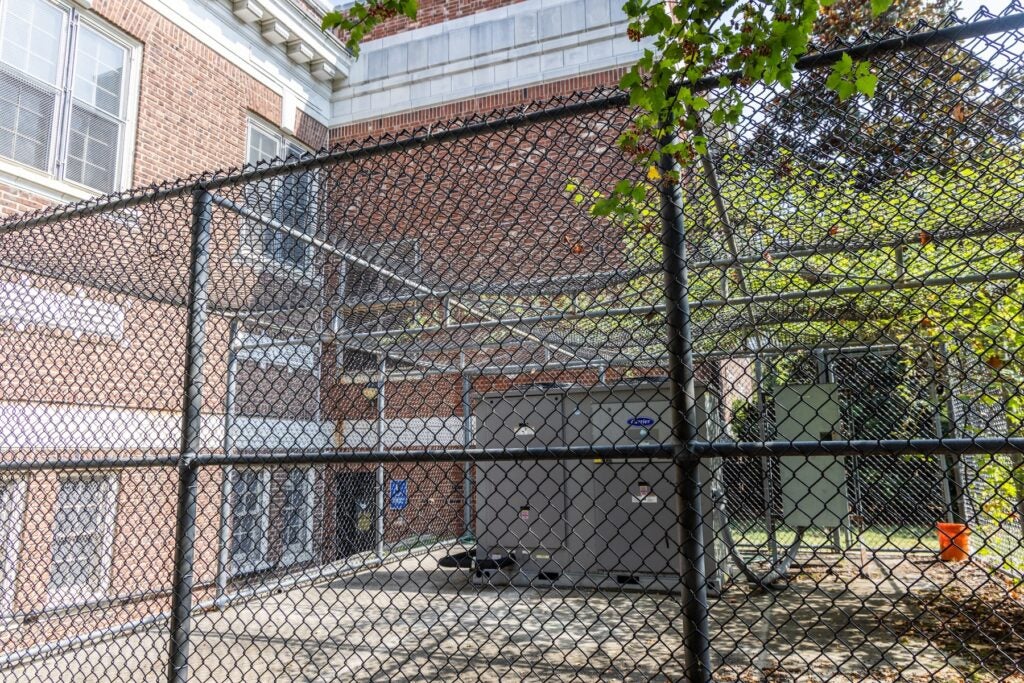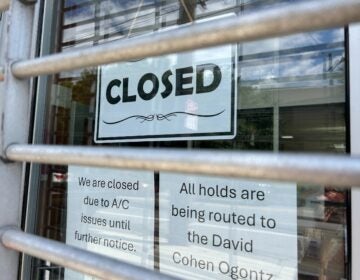‘We were roasting’: More than half of Philly’s libraries closed due to air conditioning issues this summer
The libraries closed due to cooling issues for a collective 3,900 hours — more than for staff shortages, July’s city workers strike or other building issues.
Have a question about Philly’s neighborhoods or the systems that shape them? PlanPhilly reporters want to hear from you! Ask us a question or send us a story idea you think we should cover.
Oak Lane Library was supposed to host the Free Library of Philadelphia’s annual summer reading challenge, provide free lunches for kids, and be available as a cooling center this past summer.
But none of that happened, because a coil in the library’s air conditioner broke. The library closed its doors to patrons in early June.
With just fans running, the temperature inside the building — which is more than a century old — climbed past 90 degrees Fahrenheit, said branch manager Catherine Collins, who continued offering book pickups throughout the summer.
“It was extremely hot,” Collins said.
Because of the age of the building’s air conditioner, the replacement coil needed to be custom-made, Collins said. But when the part came in the following month, it was broken. The Free Library ordered a replacement part, which was successfully installed in August. The Oak Lane branch’s roof was then replaced, and the library finally reopened in September.

Collins said patrons have been excited to return. They can now access the library’s public computers, dedicated teen section, craft and game rentals and chess boards.
“We had people hugging us, ‘We’re so glad to see you. We can’t wait to be back at the library,’” Collins said.

More than half of Philadelphia’s public library branches — 31 of them — closed at some point this summer because their air conditioning was broken or not working well enough to keep the building a safe and comfortable temperature, according to data provided by the Free Library of Philadelphia. These closures outpaced those of last summer, when cooling issues shuttered more than one-third of the city’s library branches.
Some branches closed for just a few hours between June and August, while others, like Oak Lane, closed for weeks. McPherson Square Library in Kensington remains closed due to cooling issues and is expected to reopen in early November.

In total, library branches shut their doors due to cooling issues for around 3,900 hours this summer — more than for staff shortages, July’s city workers strike or other building issues.
“The issues are mounting,” said Jessica Walker, a union steward with AFSCME District Council 47, local 2186 and a library worker at the Walnut Street West branch, which closed for weeks this summer due to cooling issues. “The HVAC issues system-wide feel like they are getting worse, and we’re seeing more closures.”
In a statement, Free Library spokesperson Mark Graham apologized for the impact of the closures and said the department is working to prevent them.
“We are sorry for the inconvenience when libraries close and are working hard to make closures rarer in the future,” Graham wrote. “To do better in the future, we have been mobilizing our resources to maintain, repair and replace our heating and cooling systems.”
Free Library blames old equipment, hotter summers
Graham said the libraries’ air conditioning issues stem from outdated heating and cooling systems. As in the case of Oak Lane Library, when these systems break, they often require old replacement parts that are “out of stock,” he said. This causes repairs to take longer.
“Like many who manage older buildings with budget restrictions, we face challenges,” Graham said. “On some days this summer, we faced more extreme summer heat and humidity due to climate change.”

Philadelphia’s average temperature during the summer and the number of days each year that top 90 degrees Fahrenheit in the city are both trending up. This past summer, the city saw a dozen days where the high temperatures were made at least twice as likely by climate change, according to the research nonprofit Climate Central.
“This taxes our historic, beautiful buildings,” Graham wrote.
Missed library programming, concerns about broken trust
Charles Santore library in South Philadelphia feels like a “greenhouse” when the central air conditioner is broken, like it was this summer, said Lindsay Friedman, a library worker and member of the union, AFSCME District Council 47, local 2187.
The Free Library installed temporary air conditioning units and dehumidifiers in the branch. Friedman said these helped, but were often not able to keep the library within the required temperature and humidity limits. Many days, the climate inside the library started within the acceptable range in the mornings, but by midday, the branch would get too hot to stay open, she said.
“We were roasting,” Friedman said. “Slowly roasting.”

The Charles Santore Library ended up canceling programming, including chair yoga, chess club and the summer reading challenge for kids, Friedman said. She worries that patrons who found the library closed this summer may not come back.
“I think we’ve lost a lot of people along the way,” she said.
In the University City neighborhood, Walker’s Walnut Street West branch shut its doors in early June due to a broken air conditioner and remained closed until late July. The branch’s air conditioner is at least two decades old and had become less reliable in recent years, Walker said. The branch also closed several days last summer due to cooling issues.
“[The air conditioner] has been sort of limping along for quite a while,” Walker said. “It finally just kind of needed resuscitation.”
With the branch closed for weeks awaiting contractors and parts, patrons missed out on storytime, literacy and science programming for kids and a community space where neighborhood groups meet, Walker said. They also lost access to public computers that can be used for job applications or paying bills.
“It sort of erodes trust in libraries that we’re open and that we’re reliable,” she said, “and that you can promise your family that you’re going to go on a certain day, or you can decide … to do your resume, or someone’s going to be able to help you with your LIHEAP.”
“We’re just not there,” she added.
Collins, the librarian at Oak Lane, said its closure interrupted the library’s relationships with neighbors.
“We’ve got older people who maybe we’re some of the few people that they see each day,” she said. “I think just having that personal interaction was missed.”
Even ‘cooling center’ libraries struggle to stay cool
Libraries are a key part of the city’s strategy to keep residents safe during periods of extreme heat, like the deadly heat wave that baked Philadelphia in June.
When the city declares a heat health emergency, it extends hours at certain libraries, recreation centers and senior centers, designating them as “cooling centers” where residents can take refuge in the air conditioning.
Five library branches that acted as cooling centers during the June heat wave closed before or after the heat wave due to cooling issues. These were Northeast Regional, Haverford, Widener, Fumo Family and Ramonita G. de Rodriguez libraries.
Oak Lane, Walnut Street West and Charles Santore libraries all served as cooling centers last summer, but were closed due to cooling issues during the heat health emergency this past June.
“We’re being asked to provide this safe space or this available space during heat or cold emergencies,” Walker said. “But … our buildings’ ability to heat and cool, in most of our buildings, has been neglected for quite a long time, and it feels like it’s starting to add up.”

The Free Library plans to replace at least five air conditioners per year
The issue boils down to funding, said Kate Goodman, a union steward in District Council 47 local 2187, and library worker at a branch that closed last summer due to cooling issues.
“If there’s not more money from the city budget, from the Mayor and City Council, to fix and update these heating and cooling systems, this is going to get worse and worse, especially as the winters get more unpredictable and the summers get hotter,” Goodman said.
Replacing a library’s air conditioning system is expensive — $500,000 to $1 million, depending on the “scope, design, equipment and materials,” Graham said.
The Free Library’s budget has grown in recent years. The department’s allocation in the city’s annual operating budget — which funds staff salaries, day-to-day operations and maintenance — has nearly doubled since it was cut in the first year of the pandemic.
The Free Library’s capital budget, which is used for large facilities investments such as renovations or HVAC replacements, has grown even faster during that time.
This increase in funding should soon show results, according to Graham, with the Free Library.
Thanks to the department’s increased capital budget and renovations through Rebuild, new heating, ventilation and air-conditioning systems are in place this year at Richmond, Frankford, Lawncrest, Paschalville, Kingsessing and Blanche A. Nixon/Cobbs Creek libraries, Graham said.
Air conditioning replacements are currently underway at Torresdale and McPherson Square libraries. Replacements will start at Charles Santore, Fishtown and West Oak Lane later this fall.
The Free Library has been assessing its facilities and, going forward, plans to replace at least five heating, ventilation and air-conditioning systems per year, in addition to repairs, Graham said.

Subscribe to PlanPhilly
WHYY is your source for fact-based, in-depth journalism and information. As a nonprofit organization, we rely on financial support from readers like you. Please give today.







